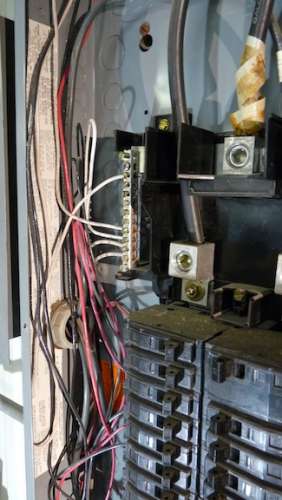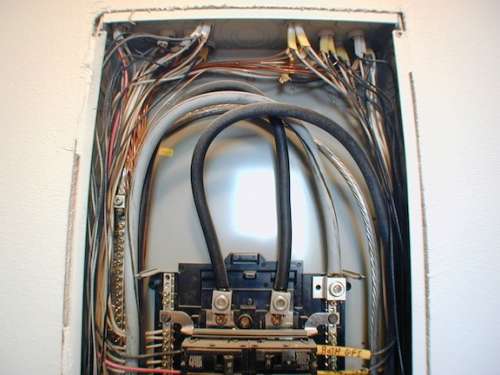Inspecting the Panel Interior
Once the cover is off the panel, many energized components are exposed to touch. Inspectors should not insert anything into the panel that can conduct electricity, including fingers and metal tools.
There are two reasons that inspectors may be tempted to reach into a panel. One reason is to move the conductors aside in order to read and photograph the label that lists the amperage rating of the enclosure.
These labels are often affixed to the side of the panel and are partially obscured by conductors.
Another reason is to confirm the size of the entrance conductors, or the conductors feeding sub-panels. The printing on these conductors is sometimes difficult to see due to their position on the side of the conductor facing away from the inspector, or because of dust accumulation on the insulation.
Inspectors should resist the temptation to reach into the panel. Accidents involving contact with energized electrical components can be serious or even fatal. Instead, inspectors can comment in their inspection report that they were unable to safely retrieve information, such as the entrance conductor or panel amperage ratings. This is perfectly acceptable and not at all unusual.
One of the hazards of pushing conductors aside is that, due to a loose connection or a break in the insulation protecting the wire conductor, moving the conductors may cause an unprotected wire to come into contact with grounded components, such as the grounding bus bar or the metal panel itself. This can cause an explosive short circuit, similar to that described in the section on removing panel screws.
When an inspector is accompanied by someone who may not be aware of the dangers associated with touching exposed, energized electrical components, such as a client, agent, homeowner or occupant, that person may be tempted to point to an item in the panel that is being discussed, such as a defect of some type. Inspectors should take action to ensure the safety of anyone approaching an electrical panel. This means preventing them from approaching the panel closely, or verbally warning them not to reach toward the panel for any reason, including pointing. They may forget and reach toward the panel anyway, and inspectors should be ready to physically prevent their contact. Laser pointers are inexpensive and work well for safely identifying specific components being discussed without touching them.
For the same reason, after the dead front has been removed, an inspector should not leave the room if there is a chance that someone unfamiliar the dangers associated with touching exposed, energized electrical components may enter the room during the inspector’s absence.

